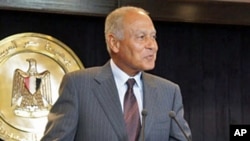Egypt's foreign minister says the issue of Israeli construction in the occupied West Bank remains a great obstacle to renewed Middle East peace talks.
Egyptian Foreign Minister Ahmed Abul Gheit told reporters he should not discuss details of the negotiations, but said Egypt has confirmed that no Arab, Palestinian, Egyptian or what he called "international" side will agree to continue talks if they are confronted with obstacles.
Abul Gheit said Israel's resumption of settlement construction on Palestinian lands would represent "a great obstacle."
The talks in Sharm el Sheikh were held less than two weeks before the building moratorium is set to expire. While border and security issues topped the official agenda, the approaching deadline has added an urgency to the discussions. Shortly before this second round of talks got under way, Israeli Prime Minister Benjamin Netanyahu hinted at a possible compromise.
But Abul Gheit said there is no optimism about whether the freeze would be renewed after the September 26 deadline.
"That is difficult to predict and I would never predict such a difficult, difficult, difficult assumption. But I think it has to," he said.
The Egyptian foreign minister spoke as an unscheduled second meeting of the day between Mr. Netanyahu, Palestinian President Mahmoud Abbas and U.S. Secretary of State Hillary Clinton was under way. The tenor and subject of those talks was not immediately made known.
Abul Gheit added that, in the earlier discussions, Israel's insistence on being considered a Jewish state came up, but he did not elaborate. Palestinians have objected to the designation, arguing it would put in jeopardy the status of the 20 percent of Israelis who are Arab.
The diplomat noted that Egypt, which was the first Arab state to recognize Israel, is partial to the Palestinian side, but will work to persuade Israeli negotiators to overcome all obstacles. Despite the contentiousness of the subjects, he stressed the negotiations are still in the early stages.
Egyptian Diplomat says Israeli Settlement Freeze Remains Key




